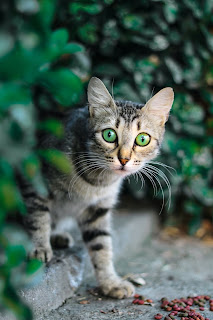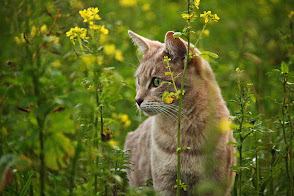Fighting Cat Spraying
Not being able to understand what our kittens or cats are trying to tell us with their behaviour is a main cause of pet owners' frustration. This situation gets to extreme proportions when our pet cat is uncontrollably spraying and peeing all around the house.
We can see that our cats meow and whine at us but we keep looking at them without being able to decipher exactly what they want to convey and, next we see that they desperately do their thing almost right in front of us, outside the litter box and by the wall or at any other corner where he manages to get. Why our cat would be avoiding the litter box? The answer is in our capacity to really understand the causes of their behaviour the best possible way.
Encouraging The use Of The Litter Box
Training your cat to use the litter box is not an easy task but the results are well worth going through any hardships.
We must understand that, by nature, cats look for a dry and not-so-smelly sand or piece of soil where to soothe their hygienic needs so, one of the reasons why these creatures avoid the litter box may be that either the sand is humid or smelly or both of them.
- Avoid scented litter or at least try to use unscented litter until you see that your cat is adapted to the daily use of the litter box.
- Keep the litter box clean by removing the soiled litter the soonest possible after use. Change the litter completely and wash the box at least once a week.
- In the event of having more than one cat, make an effort to provide one litter box for each one of them. It has been observed that cats do not feel at ease when having to share their litter box.
- The location chosen to place the litter box is fundamental. It takes keen observation of your part to spot a place that best suits the persons who live in the house as well as the cats themselves. A basic rule to respect is to never place the litter box near where your cat eats and drinks. Try to also reserve your cat a bit of privacy.
- The use of some attractant products may help in the enticing them to use the box.
These above-mentioned tips may help you solve your cat's reluctance to using the litter box for urinating or defecating mostly when the reasons involved are that they are too young or that we simply do not have the right conditions to prevent them from urinating and spraying all around the house. These are things that, to a certain extent, can be successfully managed by the cat owner.
Nonetheless, cats may also stop using the litter box when they have a medical problem so, it is recommended to schedule a visit to a veterinarian the soonest possible. Only a specialist can diagnose and and treat these conditions properly.
Cats Medical Condition
When we notice that our cat is not using the litter box under suspicion of a medical condition, then there's not much that we can do except from taking it to see a veterinarian.
Inappropriate urinating into the rug or on the bed may be a signal that your cat can't hold it any longer and can't make it to the litter box on time.
Noticing that our cat is peeing and spraying almost wherever at home often signals that something is wrong with their urinary system and it is better having a veterinarian look into it at once.
As regards cat care, urinary problems can be serious and are often painful. It can be noticed at times when your cat meows or seems to cry, for example, when attempting to urinate. At times, the urine could contain blood or appears cloudy or in small quantities.
These urinary problems can also be caused by a simple bladder infection. By following the instructions of a specialist, this infection can be treated timely with antibiotics to avoid further complications.
Interstitial cystitis is a condition that involves the urethra and the inflamed and irritated bladder. In this case, crystals might be present in the urine. Dietary changes may help soothe this condition as antibiotics appear to have little effect on it. A specialist will best advise about how to proceed in this event.
Another medical problem that may affect our cat's urinating behaviour is the so called Feline Incontinence. This trouble is caused by bladder stones that can at times grow to a significant size, nearly filling the bladder. Stones generally have to be removed surgically.
In some extreme cases some cat owners have to deal with the presence of tumours that also cause your cat to urinate frequently and inappropriately.
An important piece of information to add is that these urinary problems are much more common in male cats who have not been neutered.
The following prophylactic measures might help in preventing or reducing the occurrence of these problems:
Make sure your cat drinks as much water as possible.
Diets that are more acidic will help prevent the formation of crystals and stones.
Canned food is recommended to keep the urinary tract normal.
Feed many small meals during the day, rather than one or two big ones.
We can never be 100% sure to avoid the occurrence of some medical conditions in our pet, but it is proven that the better we understand them the better we are prepared to support them and guarantee our lovely cats a descent life as part of our family.
If you want to learn more on how to stop your cat from spraying around the house check Cat Spraying No More.
"Breakthrough Japanese study shows that cats can understand human emotions, even words". See here for more on how to understand and communicate with cats.



No comments:
Post a Comment